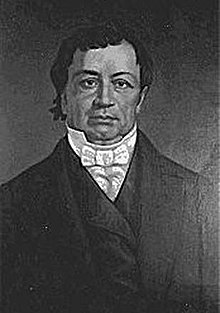William Badger
William Badger (born January 13, 1779 in Gilmanton , Belknap County , New Hampshire , † September 21, 1852 ibid) was an American politician and governor of the state of New Hampshire from 1834 to 1836 .
Early years
William Badger attended local schools in his homeland. He then began a successful career as a businessman. In Gilmanton he founded a cotton textile factory, a sawmill and a flour mill. In 1804 he was elected curator of the Gilmanton Academy . He later became chairman of the board of trustees.
Political rise
Between 1805 and 1812 he was on the staff of Governor John Langdon . From 1810 to 1812 he was also a member of the New Hampshire House of Representatives . He spent the years 1814 to 1817 in the Senate of his state, where he had served as President from 1817. Between 1816 and 1820 Badger was an associate judge on an appeals court and from 1820 to 1830 he was the sheriff chief of police in Strafford County . In 1824, 1836 and 1844 he was an elector in the presidential elections. In 1834 he was elected governor of his state as a candidate for the Democratic Party .
New Hampshire Governor
William Badger took up his new office on June 5, 1834. After being re-elected the following year, he could remain in office until June 2, 1836. As governor, he campaigned for a smallpox vaccination in the rural areas of his state. Badger assisted President Andrew Jackson in his quest to crush the United States Bank . Governor Badger was also an opponent of the death penalty. During his tenure, the statutes of the militia were reformed. In addition, Badger had to deal with the problems of the so-called "Republic of Indian Stream".
The Republic of Indian Stream
Since the end of the Revolutionary War in 1783, there has been an area in the north of what is now New Hampshire, the border between the United States and Great Britain being disputed. The provisions of the peace treaty at the time were unclear with regard to this border issue. Hence, both the British and the Americans claimed this area for themselves. About 360 settlers were affected by this situation. They were viewed as respective subjects by both the British and American authorities and committed to serving both sides. After 50 years of this untenable situation for them, the settlers took this matter into their own hands and declared themselves an independent republic on July 9, 1832, named after a river called the Indian Stream . Pittsburg became the capital of the new state .
As a result, however, there was internal unrest between the supporters of the British or Canada and the US Americans in the now independent republic . Finally, the new state's Congress sought help from Governor Badger. At the request of pro-American forces, the latter had his state's militia march in and occupy the state. Since neither Washington nor London wanted to risk a war because of this relatively insignificant area, negotiations were swiftly initiated. In 1835 the Indian Stream Republic became part of the state of New Hampshire. This solution was also enshrined in the Webster-Ashburton Treaty of 1842, which also regulated other contentious border issues between the two nations.
Another résumé
After the end of his tenure, Badger withdrew from politics. He devoted himself to his private interests and died in September 1852 in his hometown of Gilmanton. William Badger was married twice and had a total of four children.
literature
- Robert Sobel and John Raimo (Eds.): Biographical Directory of the Governors of the United States, 1789–1978. Volume 3, Meckler Books, Westport, 1978. 4 volumes.
Web links
- William Badger in the National Governors Association (English)
- Biography of New Hampshire (English)
- William Badger in the database of Find a Grave (English)
| personal data | |
|---|---|
| SURNAME | Badger, William |
| BRIEF DESCRIPTION | American politician |
| DATE OF BIRTH | January 13, 1779 |
| PLACE OF BIRTH | Gilmanton , New Hampshire |
| DATE OF DEATH | September 21, 1852 |
| Place of death | Gilmanton , New Hampshire |

